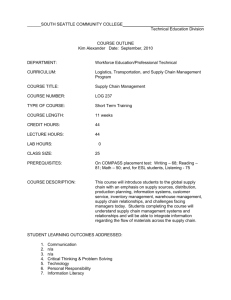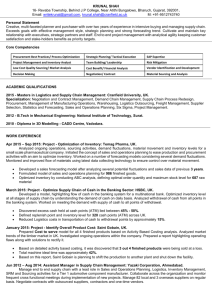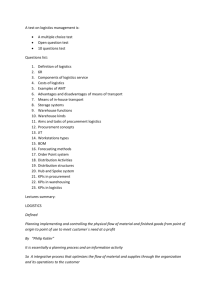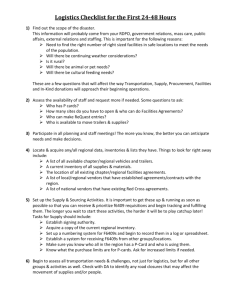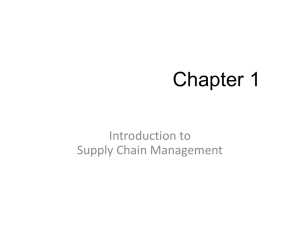In Collaboration with Institute of Supply Chain Management
advertisement
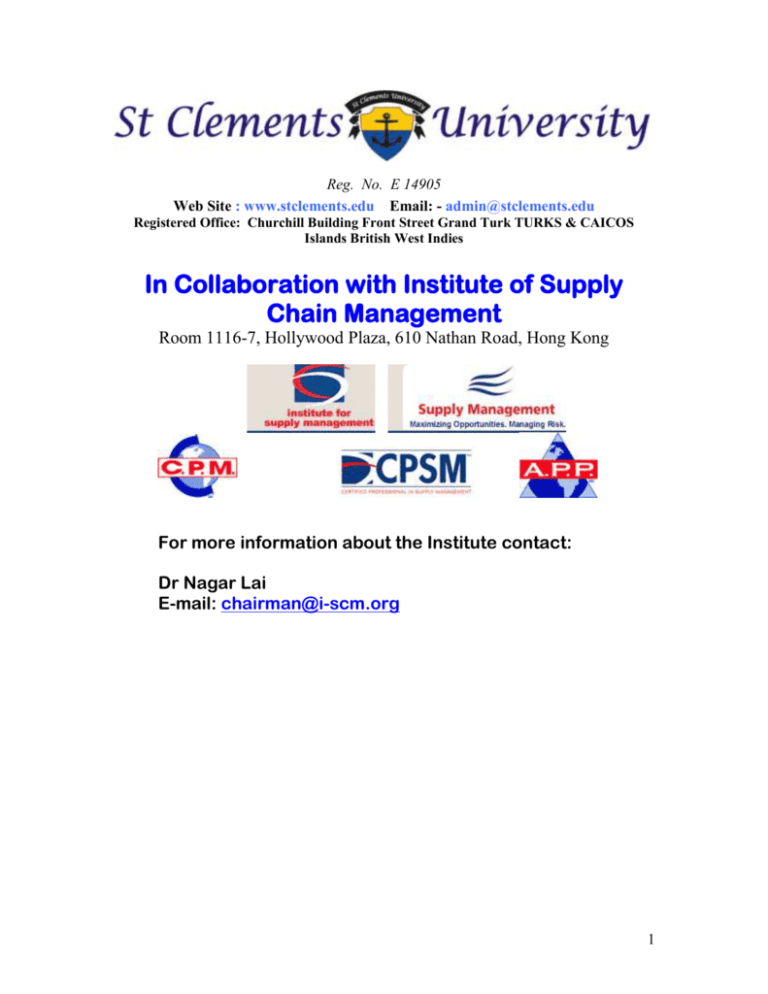
Reg. No. E 14905 Web Site : www.stclements.edu Email: - admin@stclements.edu Registered Office: Churchill Building Front Street Grand Turk TURKS & CAICOS Islands British West Indies In Collaboration with Institute of Supply Chain Management Room 1116-7, Hollywood Plaza, 610 Nathan Road, Hong Kong For more information about the Institute contact: Dr Nagar Lai E-mail: chairman@i-scm.org 1 BRIEFING 1. Students without a first degree but with age 25 and 2 years of executive experience will have to complete Postgraduate Diploma of the final part of the Institute of Supply Chain Management, Hong and proceed to master degree by taking only four (4) subjects. 2. Degree holders may apply for subject exemption in some subjects in Postgraduate Diploma if they have studied the subjects before. 3. The Institute of Supply Chain Management (ISCM) is authorized representative of the China Business Manager Association, which is the biggest National Logistics Manager Certification association in greater China. 4. ISCM is a non profit, professional organization that aims to promote the standard of SCM formed according to British Law. We are one of the accredited training and exam centre for China National Certified Logistics Manager, issued by the China State Government Commerce Ministry. We have been one of theacademic members of the Supply Chain Council for 5 years. We are the largest SCM training institution in this region. 5. ISCM also co-produce publication and research with Universities and government agencies. Our joint publication Logistics Management is the most important publication for logistics in south China. 6. Logistics is quite different from many other disciplines in that different parts of the world have different 2 rules(though people are slowly trying to have some common practice, but the road ahead is long, and most people follow the USA practice due to trading practice and the purchase order is from USA). The professional institutes can hardly influence each other due to different practices. Therefore, ISCM has decided at this part of the globe to work closely with the China authorities, instead of the British ones. However, as a Master degree holder this is obvious that the students would be easily admitted into their membership system. 7. ISCM is an academic member of the Supply Chain Council for four years, a global authority with Headquarter in USA, but due to the above reason ISCM decide not to continue to contribute 1 year ago. 8. We are a member of the Hong Kong Logistics and Supply Chain Management Research and Development Centre. COURSE OUTLINE POSTGRADUATE DIPLOMA OF LOGISTICS MANAGEMENT OF INSTITUTE OF SUPPLY CHAIN MANAGEMENT LEADING TO MASTER OF SCIENCE IN LOGISTICS MANAGEMENT 1. ACCOUNTING FOR MANAGERS 2. SUPPLY CHAIN MANAGEMENT 3. QUANTITATIVE METHODS FOR DECISION MAKING 4. INFORMATION TECHNOLOGY AND BUSINESS LOGISTICS **Students completing this part would get post graduate diploma 3 DETAIL OUTLINE Postgraduate Diploma of Logistics Management of Institute of Supply Chain Management leading to Master of Science in Logistics Management Institute of Supply Chain Management with St Clements University Each course is 36 hours teaching, 48 hours of self study with 12 hours of assignment and examination of 3 hours. For distance learning a thesis of 15000 words at the master level would replace all the examinations (but assignment is still required). 1 ACCOUNTING FOR MANAGERS A conceptual introduction to accounting, focusing on accounting from the viewpoint of the manager's specific needs for financial information. Key areas to be covered include: decision making (short and long-term), internal performance evaluation, legal and quasi-legal background to financial reporting, analysis of financial statements, and strategic business accounting. 2 SUPPLY CHAIN MANAGEMENT This subject explores the formation of supply chain arrangements to increase channel competitiveness. To achieve a high degree of cooperative behavior and to improve the efficiency of the overall logistical system is one of the primary objectives of this subject. The 4 second major objective is to develop logistical models that will eliminate waste and duplication in the system. The sharing of information within and between organizations and the joint planning between strategic business units aimed at inventory minimization in the system are central issues that will be examined. 3. QUANTITATIVE METHODS FOR DECISION MAKING This subject focuses on the quantitative and qualitative techniques available to managers in problem solving and decision making in organisations. Decision making models will be explored and the criteria used for rational decision making under conditions of risk and uncertainty will be examined. This decision making process will focus in areas such as forecasting, linear programming and project planning. 4. INFORMATION TECHNOLOGY and BUSINESS LOGISTICS The purpose of this Information Technology and Business Transformation (ITBT) is to provide students with a view of IT-enabled transformation and the strategic issues in the logistics management of IT. The seminar will bring in CIOs, CEOs, and experienced consultants and industry observers to provide their perspectives and tell their stories about the use and management of IT today in logistics management. Students completing this part would get a postgraduate diploma. 5. INVENTORY MANAGEMENT (open) 5 This subject aims to provide the student with state-ofthe-art knowledge of inventory management theory and practice. Topics included will be as follows: materials management; management of storage and retrieval facilities; types of inventory problems; measuring inventory performance; inventory management systems for independent demand items; influence of forecasts and uncertainties of demand and lead time; dependent demand inventory systems; decision models for inventory management; simulation models of inventory management systems; and case studies of world-class inventory management. X6. TRANSPORT LOGISTICS MANAGEMENT AND PLANNING This subject provides the student with state-of-the-art knowledge of management systems relating to the transportation of products within manufacturing plants and their distribution to the market. Topics covered will include: location analysis; location planning; layout planning; transportation systems in manufacturing plants; managing the distribution of finished products; optimum vehicle routing techniques; and achieving high quality delivery performance. 7. OPERATIONS MANAGEMENT This subject is a study of the design and operations of activities for the production of goods and services. Topics include: qualitative and quantitative forecasting, production planning, scheduling, management of quality and productivity, project management and flexible manufacturing systems (FMS). Emphasis will be placed on a comparison of Japanese production and quality management methods with traditional Western 6 methods, total quality management (TQM), computer aided manufacturing (CAM), and implications for human resource management. X8. PROCUREMENT AND MANAGEMENT In most leading firms today, the function that used to be called purchasing, or procurement, has expanded to become Supply Management. This subject looks at the expanded responsibility of procurement and its integration with long-term strategic corporate planning. Procurement now includes participating collaboratively in key material requirements determinations and supplier qualification; and focuses on the management of supplier relations and performance. This subject incorporates all these areas in the development of procurement and supply chain management. The subjects with x are under content restructuring and subject to final notice. Master of Science in Logistics Management COURSE OUTLINE 1 ACCOUNTING FOR MANAGERS 2 SUPPLY CHAIN MANAGEMENT 3. QUANTITATIVE METHODS FOR DECISION MAKING 4. INVENTORY MANAGEMENT (open) 5. TRANSPORT LOGISTICS MANAGEMENT AND PLANNING 6. OPERATIONS MANAGEMENT 7. PROCUREMENT AND MANAGEMENT 8. INFORMATION TECHNOLOGY and BUSINESS LOGISTICS 7 DETAIL COURSE OUTLINE Master of Science in Logistics Management Institute of Supply Chain Management with St Clements University Each course is 36 hours teaching, 48 hours of self study with 12 hours of assignment and examination of 3 hours 1 ACCOUNTING FOR MANAGERS A conceptual introduction to accounting, focusing on accounting from the viewpoint of the manager's specific needs for financial information. Key areas to be covered include: decision making (short and long-term), internal performance evaluation, legal and quasi-legal background to financial reporting, analysis of financial statements, and strategic business accounting. 2 SUPPLY CHAIN MANAGEMENT This subject explores the formation of supply chain arrangements to increase channel competitiveness. To achieve a high degree of cooperative behavior and to improve the efficiency of the overall logistical system is one of the primary objectives of this subject. The second major objective is to develop logistical models that will eliminate waste and duplication in the system. The sharing of information within and between organizations and the joint planning between strategic business units aimed at inventory minimization in the system are central issues that will be examined. 8 3. QUANTITATIVE METHODS FOR DECISION MAKING This subject focuses on the quantitative and qualitative techniques available to managers in problem solving and decision making in organisations. Decision making models will be explored and the criteria used for rational decision making under conditions of risk and uncertainty will be examined. This decision making process will focus in areas such as forecasting, linear programming and project planning. 4. INVENTORY MANAGEMENT (open) This subject aims to provide the student with state-of-the-art knowledge of inventory management theory and practice. Topics included will be as follows: materials management; management of storage and retrieval facilities; types of inventory problems; measuring inventory performance; inventory management systems for independent demand items; influence of forecasts and uncertainties of demand and lead time; dependent demand inventory systems; decision models for inventory management; simulation models of inventory management systems; and case studies of world-class inventory management. x5. TRANSPORT LOGISTICS MANAGEMENT AND PLANNING This subject provides the student with state-of-the-art knowledge of management systems relating to the transportation of products within manufacturing plants and their distribution to the market. Topics covered will include: location analysis; location planning; layout planning; transportation systems in manufacturing plants; managing the distribution of finished products; optimum vehicle routing techniques; and achieving high quality delivery performance. 9 6. OPERATIONS MANAGEMENT This subject is a study of the design and operations of activities for the production of goods and services. Topics include: qualitative and quantitative forecasting, production planning, scheduling, management of quality and productivity, project management and flexible manufacturing systems (FMS). Emphasis will be placed on a comparison of Japanese production and quality management methods with traditional Western methods, total quality management (TQM), computer aided manufacturing (CAM), and implications for human resource management. x7. PROCUREMENT AND MANAGEMENT In most leading firms today, the function that used to be called purchasing, or procurement, has expanded to become Supply Management. This subject looks at the expanded responsibility of procurement and its integration with longterm strategic corporate planning. Procurement now includes participating collaboratively in key material requirements determinations and supplier qualification; and focuses on the management of supplier relations and performance. This subject incorporates all these areas in the development of procurement and supply chain management. 8. INFORMATION TECHNOLOGY and BUSINESS LOGISTICS The purpose of this Information Technology and Business Transformation (ITBT) is to provide students with a view of IT-enabled transformation and the strategic issues in the logistics management of IT. The seminar will bring in CIOs, CEOs, and experienced consultants and industry observers to 10 provide their perspectives and tell their stories about the use and management of IT today in logistics management. COST OF COURSE MASTER USD$5,950 ** Cost of fees include cost of textbooks 11
